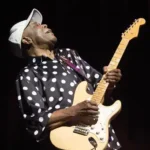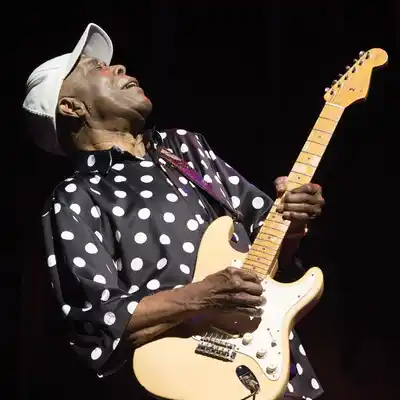
Buddy Guy – The Electric Blues Maestro and His Strings of Stories
Born to be a legend, Buddy Guy has been instrumental in shaping the blues genre as we know it. With a guitar in hand and his soulful voice, Buddy has created magic, and we’ve been blessed to witness it.
Table of Contents
Early Life: From Louisiana to Chicago
Buddy Guy, born George Guy on July 30, 1936, in Lettsworth, Louisiana, began his tryst with the guitar at a young age. Raised in the Deep South during a tumultuous time in American history, the blues was not just a genre for Buddy; it was a reflection of life.
Armed with just his guitar and a dream, Buddy moved to Chicago in 1957. The Windy City was buzzing with the electric blues scene, and Buddy, with his unique style and raw energy, fit right in.
Muddy Waters: The Mentor and the Muse
Upon his arrival in Chicago, Buddy was taken under the wing of another blues legend, Muddy Waters. Waters became a mentor to the young Buddy, nurturing his talent and guiding him through the intricacies of the Chicago blues scene. Together, they created some of the most memorable blues tracks, setting the stage for Buddy’s rise to stardom.
Buddy’s Signature Style
When you hear Buddy Guy play, you know it’s him. His guitar work is frenetic, yet controlled; wild, yet soulful.
Buddy’s style, a mix of traditional blues with a hint of rock and roll, made him stand out. He wasn’t just playing the blues; he was reinventing it.
The Polka Dot Craze
If you’ve ever seen Buddy Guy perform, you might have noticed his love for “polka dots.” From his guitars to his shirts and even some of his album covers, polka dots have become synonymous with Buddy. It’s a tribute to his late mother. It’s a sweet gesture and a testament to the bond they shared.
Collaborations and Mentorship
Buddy Guy’s influence isn’t just limited to the blues genre. Over the years, he’s collaborated with artists from various backgrounds, including Eric Clapton, Jeff Beck, and Stevie Ray Vaughan, to name a few.
Buddy Guy’s impact isn’t just limited to his music; he’s been a mentor to countless young artists. Just as Muddy Waters took a young Buddy under his wing, Buddy has been known to nurture and guide budding talents.
“Legends”
If you’ve ever been to Chicago and fancy yourself a blues lover, there’s one place that’s likely been on your list: Buddy Guy’s Legends. Established in 1989, ‘Legends’ isn’t just a blues club; it’s a mecca for blues enthusiasts from around the world. Buddy set up Legends as a way to keep the blues alive and to provide a platform for emerging artists. Over the years, the club has seen performances from both up-and-coming artists and established legends, making it a must-visit spot in Chicago.
Trials and Triumphs
Like many artists, Buddy’s journey hasn’t been without its challenges. From facing racial discrimination in the early days of his career to navigating the ever-changing music industry landscape, he’s seen it all. Yet, through it all, he’s remained true to his art, using music as a way to communicate, heal, and inspire.
Recognition for Buddy’s immense contribution to music has poured in throughout his career. With multiple Grammy Awards under his belt and a place in the Rock and Roll Hall of Fame, his talent and impact are undeniable.
Many contemporary artists, including the likes of John Mayer and Eric Clapton, cite Buddy as a major influence. His music, a blend of traditional and modern blues, has inspired a new generation of artists and continues to resonate with audiences worldwide.
Even in his 80s, Buddy shows no signs of slowing down. With his recent album, “The Blues is Alive and Well,” he proves that age is just a number.
Buddy Guy is not just a musician; he is a living legend for fans across the globe.
